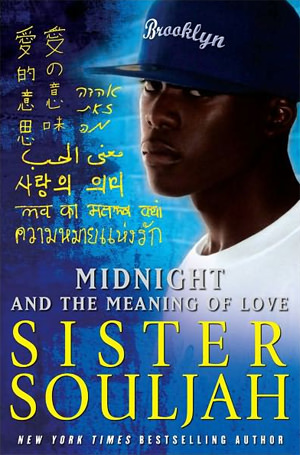‘Midnight’ and the Meaning of Trust
Fiction is supposed to provide escape. Action/adventure romances are written for youthful readers and the young at heart, but Sister Souljah makes several choices as an author in her new novel, "Midnight and the Meaning of Love," that make it difficult to trust her. From the outset, "Midnight and the Meaning of Love" is an unbelievable story.
An excerpt from “Midnight and the Meaning of Love” was published on Truthdig here.
Midnight, a Sudanese immigrant living in the Brooklyn projects, traipses across Asia to retrieve his wife, Akemi, who was kidnapped by her father, a powerful Japanese businessman. Joined by a trained female ninja fighter named Chiasa, Midnight outsmarts everyone, defies the laws of nature and finally reunites with his wife in some steamy sex scenes. By the way, Midnight and Akemi speak no language in common, and the three core characters are all 16. From the outset, “Midnight and the Meaning of Love” is an unbelievable story.
Fiction is supposed to provide escape. Action/adventure romances are written for youthful readers and the young at heart, but Sister Souljah makes several choices as an author in her new novel, “Midnight and the Meaning of Love,” that make it difficult to trust her. For example, the book is a sequel in a series of prequels based on Sister Souljah’s best-selling novel “The Coldest Winter Ever.” In “Winter,” Midnight is the mysterious right-hand man of a powerful extralegal businessman. In “Midnight: A Gangster’s Love Story,” readers meet Midnight as a young boy who is finding himself and falling in love. The prequels are an excellent marketing ploy. “Winter” is a cult classic among street literature readers who fell in love with the sassy Winter Santiago and her many machinations.
Souljah is wise to capitalize on that popularity. Her mistake is creating inconsistency in the character Midnight. No one who has read “Winter” is going to recognize Midnight in “The Meaning of Love.” Two completely different characters share the same name for marketing purposes only. Surely Souljah intends to write several more novels that flesh out the character and explain the circumstances that led to his appearance in “Winter,” but after taking in this 608-page tome, readers are left with no new clues about how Midnight went from being a moralistic Muslim to a gangster.
For the moment, Midnight is devout and disciplined. It’s refreshing to read a relatively unbiased presentation of Islam. Midnight abides by the Quran and observes Ramadan. His intensely passionate love for his family is admirable. Unfortunately, this book about the meaning of love for family does not extend to outsiders. Midnight hates African-Americans. He claims superiority over blacks with slave ancestry when he says, “I don’t have one drop of inferiority in my blood or mind.” Midnight describes black Americans as “fools, clowns, and useless, cruel creatures.” Another Muslim character refers to African-Americans as “animals” with “no God, no boundaries, no limits, no respect for life.” Midnight justifies skullduggery by claiming that “niggas” with no boundaries and limits deserve to die.
All of these stereotypes are firmly established before the black American characters disappear entirely during the parts of the story that take place in Japan and Korea. Why would a social justice advocate like Sister Souljah acknowledge the deadly rifts between North and South Sudan and North and South Korea and yet perpetuate a division between African-Americans and Africans experiencing the same oppression in urban America? Although the enmity toward black Americans comes from a character, it becomes difficult to trust the narrator when she introduces new cultural contexts. Should the reader assume that her preference for the humanity of Koreans over the supposedly emotionless Japanese is justified?
Oddly enough, Souljah also seems to cast women in a disparaging light. Throughout the story, women are temptresses who, once tamed, must be protected like precious goods. The most extreme characters are competitive, catty and crude African-American women. None of the redemptive female characters in the book are entirely African-American. Akemi is Japanese. Chiasa is both Japanese and African-American. Bangs, the other teenage girl with whom Midnight interacts, is a victim of incest. Midnight muses on her predicament and says, “But there were signs that she allowed him to continue to violate her even after she knew it was wrong.” A woman who has previously been an advocate for black women, whose literary fame is based on a story about a black woman, now suggests that a black girl child should take responsibility for her own victimization? Souljah has never been one to miss a moral. Her pro-life commentary is crystal clear, and yet her character’s stance on rape and incest is ambivalent. Couple this with pages and pages of commentary about how women should be submissive and beneath their men, and one wonders if in her zeal to objectively portray Islam that Souljah willingly betrayed her own identity.
On her website, Sister Souljah suggests that “Midnight and the Meaning of Love” is for everyone, but anyone who was once a teenager will not believe these children could make adult decisions so easily, vanquish powerful enemies so effortlessly, reject cultural expectations so cavalierly and enjoy sex so expertly even though they just barely lost their virginity. For a story overburdened with needless details (we spend several pages reading a book within a book), Souljah’s characters encounter surprisingly few obstacles. Midnight never loses a battle. Lovers never argue. Girls readily acquiesce to all of Midnight’s desires. Potentially epic face-offs are resolved before they begin.
Ironically, the recurring theme of the novel is trust. Chiasa often says to Midnight that “a person who cannot trust anyone always ends up trusting the wrong person.” The characters successfully learn to trust one another, but as an author who misrepresents the title character, seems to hate aspects of her own identity and presents a relatively conflict-free quest, Sister Souljah forgot to lay the groundwork that encourages readers to trust her intentions as an author.
Your support matters…Independent journalism is under threat and overshadowed by heavily funded mainstream media.
You can help level the playing field. Become a member.
Your tax-deductible contribution keeps us digging beneath the headlines to give you thought-provoking, investigative reporting and analysis that unearths what's really happening- without compromise.
Give today to support our courageous, independent journalists.







You need to be a supporter to comment.
There are currently no responses to this article.
Be the first to respond.